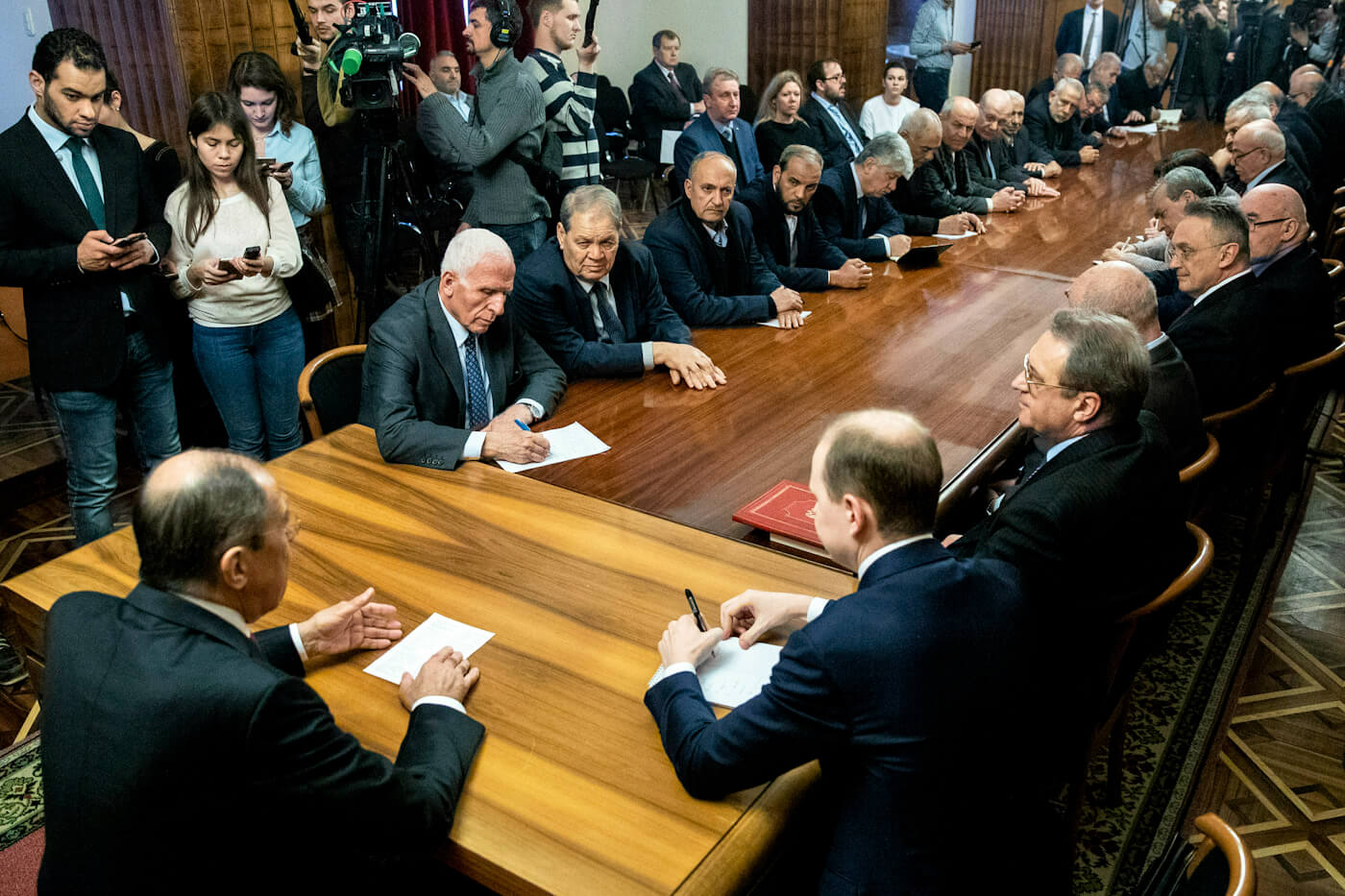The Russian-sponsored Palestinian unity talks in Moscow on February 11 were neither a success nor failure. Uniting Palestinian factions was not the main objective of the Moscow conference, in the first place.
Instead, the nature of the event, the host country and the clear messages sent to Washington and Tel Aviv were all meant to communicate something else entirely. And they did.
The head of the Fatah delegation to the conference, Azzam al-Ahmed, apologized to his hosts on behalf of Palestinians for failing to achieve political reconciliation.
But that apology could have been prepared in advance. It would not have been rational to expect that a conference organized in such haste, with few preliminary meetings or intense prior consultations, could have achieved the coveted unity.
If one is to also consider the various unity agreements, signed between Fatah and Hamas in the past – but never honored – and bearing in mind the additional punitive measures slapped by the Palestinian Authority against Gaza recently, a unity deal in Russia would be nothing less than a miracle.
So why did the Russians hold the conference in the first place and why did the Palestinians agree to attend, if its failure was a foretold conclusion?
The answer lies elsewhere, specifically in Warsaw, Poland.
Around the same time that Palestinians met in Moscow under the auspices of the Russian Foreign Minister, Sergey Lavrov, the US was holding its own conference in Warsaw, Poland.
The Warsaw meeting was the US’ attempt at drawing a new political paradigm to replace the defunct ‘peace process’, which, itself, was an American political invention.
While the ‘peace process’, thanks to US blind support of Israel, has failed terribly, Warsaw, too, is unlikely to deliver any meaningful or long-term political vision in the Middle East. The conference was the equivalent of a public American declaration that only Israel matters and that Washington’s commitment to Tel Aviv is paramount to all else.
Even the Authority of Mahmoud Abbas, known for its political subservience to Washington, was repulsed by the US’ new, brazen political approach. Time and again, the Donald Trump Administration has made it clear to its former Palestinian ally that Palestinian political aspirations are no longer a subject worthy of even mere consideration by the US. The relocating of the American embassy from Tel Aviv to Washington in May last year was one of many such signs.
Abbas, who is now increasing pressure on his Hamas rivals in Gaza, and is plotting against his own Fatah rivals in the West Bank, agreed to allow Fatah participation in the Moscow conference because he, too, has a message for the US, the gist of which is “we too have a new strategy and political alternatives.’
Knowing in advance that Trump’s so-called “deal of the century’ is likely to be consistent with the new, more aggressive US foreign policy approach to the Middle East, Fatah is keen to preclude the announcement of the ‘deal’ by seeking different routes that do not necessarily go through Washington.
For Hamas, the Islamic Jihad and other Palestinian factions, freeing Fatah from Washington’s grip is something they can also all agree on.
A Hamas official, Hussam Badran, was very clear regarding the consensus of all Palestinian participants in denouncing the “deal of the century (and) all conspiracies to eliminate the Palestinian cause.”
Musa Abu Marzouk, who led the Hamas delegation, declared from Moscow that all Palestinians factions will work together to “confront the deal of the century.”
Fatah’s position was of one and the same.
For Russia, a unified Palestinian call to defeat the latest US political stratagem in the region is consistent with Moscow’s ongoing efforts to undermine Washington’s once uncontested role in the Middle East.
True, the Palestinian factions failed to agree on a final statement written on behalf of all parties, but the disagreements were of little relevance to their political outlook concerned with Washington’s political ploys. The Islamic Jihad refuses to consider a Palestinian state within the 1967 borders, and, along with Hamas, does not see the Palestine Liberation Organization (PLO) as the one and only representative of all Palestinians, as the draft of the final statement proposed.
These positions are hardly new, especially since Hamas and the Islamic Jihad are not yet part of the PLO. Palestinian factions would need more than a two-day conference in Moscow to iron out the numerous details of such complex issues.
Russia, too, had its own messages to send. Aside from a message to the US-led Warsaw conference that Russia is ready to fill the gap left open by the US departure from the ‘peace process’, another Russian-hosted political summit in Sochi carried layers of direct and subtle meanings.

Russian Foreign Minister Sergei Lavrov, center, talks during a meeting with representatives of Palestinian groups and movements in Moscow, Russia, Feb. 12, 2019. Pavel Golovkin | AP
The tripartite Sochi summit brought Russia, Turkey and Iran together to discuss the future of Syria following the US withdrawal.
For Russia to be heavily involved in two major political processes and conflicts concerning the Middle East at the same time is unprecedented since the end of the Cold War and the disintegration of the Russian-Soviet led socialist bloc.
Those in Washington who see Moscow as an adversary must have been particularly unpleased by the new developments. The US-Russian rivalry is definitely at its highest point in many years.
Hamas and other Palestinian factions, save Fatah, would have welcomed Russia’s re-engagement, regardless of any specific political contexts. Hamas has been under massive pressure and near-complete isolation in Gaza for many years, and a political outlet of this nature is, for the Movement, a welcome development.
Hamas is now ready to upgrade its ties with Russia, especially after the Movement’s leader, Ismail Haniyeh, received an official invitation to include Russia on his next trip outside of besieged Gaza.
The major change in the political equation, however, is that Fatah has been recently dropped from the US political sponsorship list, and is desperately seeking new political and financial patrons.
Mahmoud Abbas is likely to wait for further indications of the changing American position before completely abandoning his quest of an American sponsored ‘peace’ with Israel.
All three conferences – Warsaw, Moscow and Sochi – should be enough of an indication that the new political paradigm, which has been in the making for years, is unlikely to be reversed, at least, not any time soon.
Top Photo | Russian Foreign Minister Sergei Lavrov, center, talks during a meeting with representatives of Palestinian groups and movements in Moscow, Russia, Feb. 12, 2019. Pavel Golovkin | AP
Ramzy Baroud is a journalist, author, and editor of Palestine Chronicle. His latest book is The Last Earth: A Palestinian Story (Pluto Press, 2018). He earned a Ph.D. in Palestine Studies from the University of Exeter and is a former Non-Resident Scholar at Orfalea Center for Global and International Studies, UCSB.
© Ramzy Baroud
The post Russian Mediation: The Critical Messages of the Hamas-Fatah Talks in Moscow appeared first on MintPress News.

